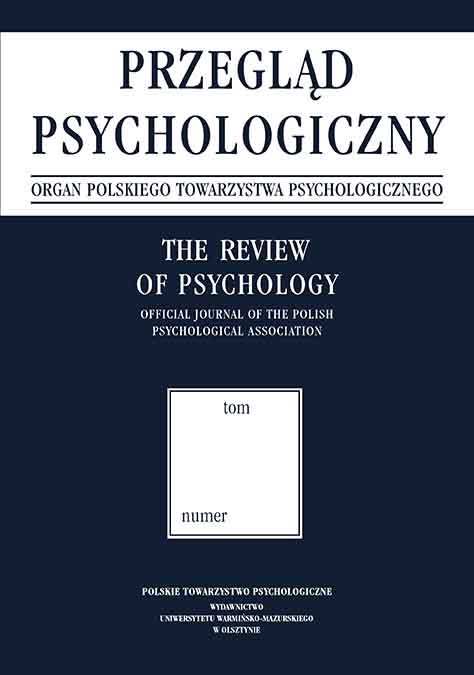Avoidant coping strategies in adolescents in situations of social conflict: an attempt to identify personality and family indicators
Avoidant coping strategies in adolescents in situations of social conflict: an attempt to identify personality and family indicators
Author(s): Danuta Borecka-BiernatSubject(s): Social psychology and group interaction, Personality Psychology
Published by: Wydawnictwo Uniwersytetu Warmińsko-Mazurskiego w Olsztynie
Keywords: youth; personality; family; avoidant coping strategy; situation of social conflict;
Summary/Abstract: Goal The purpose of the study was to determine the personality and family indicators of the avoidant coping strategy in adolescent youth in situations of social conflict. Method The study was conducted on a sample of 893 middle school students. The Rosenberg Self-Esteem Scale (SES) (adapted by Dzwonkowska, Lachowicz-Tabaczek and Łaguna), the Sense of Control Questionnaire (SCQ) by Krasowicz and Kurzyp-Wojnarska, the Stress Assessment Questionnaire (SAQ) designed by Włodarczyk and Wrześniewski, the Three-Factor Inventory of Personality States and Traits (TIPST) by Spielberger, the Parental Attitudes Scale (PAS) Plopa, the Questionnaire for Coping Strategies in Parents in Situations of Social Conflict (QSPC) by Borecka-Biernat, and Questionnaire for Coping Strategies in Adolescents in Situations of Social Conflict (QSAC) by Borecka-Biernat were used in the study. Results Young people’s strong conviction of other individuals’ impact on negative and positive outcomes of events, the perception of social conflict as challenge and reacting to that conflict with anger or anxiety co-occurs with the tendency towards the avoidant coping strategy. Among the familial determinants of the avoidant coping strategy, an important role is played by the inadequate parental attitudes towards the adolescent child, as well as the pattern of avoidance in situations of social conflict in the parents. Conclusions Learning about the causes of the avoidant coping strategy in the young person will allow the parents and teachers to better understand the adolescents’ behaviour in situations of social conflict and look at its roots from the adolescent’s perspective. Understanding the causes of this behaviour may become a starting point for creating educational strategies that help young people cope with conflict in a mature way.
Journal: Przegląd Psychologiczny
- Issue Year: 65/2022
- Issue No: 1
- Page Range: 119-135
- Page Count: 17
- Language: English

